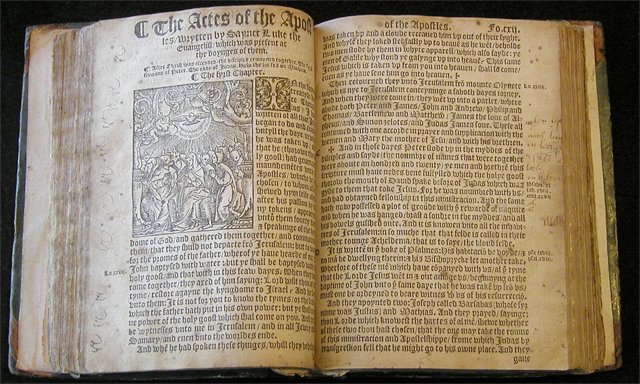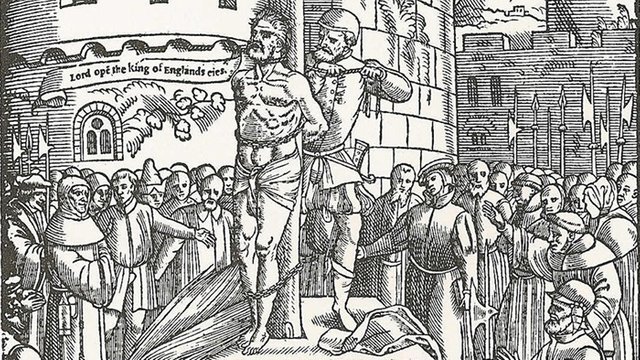October 6 in Christian History.

William Tyndale was a linguist, scholar, theologian, and priest. On October 6, 1536, he became a martyr at the hands of the church that he had devoted his life to help.
William Tyndale studied theology in Oxford, but was shocked and irritated when he was not allowed to study Scripture or even read the Bible for himself. This was a privilege reserved for only the most prestigious scholars and priests. None the less, Tyndale continued his education. He had a reputation as a keen linguist, and became fluent in nine different languages.
After serving as a chaplain for several years, Tyndale began work on the project that would leave his mark on Christianity in the English world and would lead to his death. Tyndale began translating the New Testament into the common English. Finding opposition in England, he made his way to Wittenberg, the hot seat of the infant reformation movement.
It was there that Tyndale completed his translation of the New Testament in 1525. It was quickly smuggled into England and was widely distributed. The authorities were furious. They outlawed the book and began buying copies in order to burn them. Ironically, this only served to fund Tyndale’s further work.
He moved to Antwerp, Belgium. This city was ideal due to its close proximity to England without being under British power and was relatively free from the control of the Holy Roman Empire. Tyndale lived in hiding while he completed his translation of the Old Testament. His translations would continue to have a massive impact on the British church long after his death. Nearly a century later, the translators who worked on the King James Bible drew heavily from Tyndale.

During this time, Tyndale devoted himself to aiding and ministering to the poor and to religious refugees from England. He wrote numerous tracts and books in addition to his translations. He famously taunted the pope, and wrote: “I will cause a boy that driveth the plough shall know more of the scripture than thou doest.”
In May 1535, Henry Philips, a close friend of Tyndale and a recipient of Tyndale’s generosity, accepted a deal with the local authorities to betray his friend. He lured Tyndale into a narrow alley and into the arms of waiting soldiers.
Tyndale was imprisoned, accused of heresy, and sentenced to execution. He continued to write while in prison. The following is taken from one of the tracts he wrote while awaiting his death:
“Let it not make thee despair, neither yet discourage thee, O reader, that it is forbidden thee in pain of life and goods. . . to read the Word of thy soul's health—for if God be on our side, what matter maketh it who be against us, be they bishops, cardinals, popes.”
On October 6, 1536, Tyndale was brought to the town square in Antwerp. He was fastened to a cross surrounded by brush and logs. Once again, he refused to recant his beliefs. Witnesses heard him pray the words: “Lord, Open the king of England’s eyes.” He was strangled to death and then burned.

His final prayer was answered, and just three years later, the king allowed, and even funded, the printing of Bibles in English.
Verse of the day: Hebrews 4:12
For the word of God is alive and active. Sharper than any double-edged sword, it penetrates even to dividing soul and spirit, joints and marrow; it judges the thoughts and attitudes of the heart.
I upvoted your post.
Cheers to you.
@Pinoy
Posted using https://Steeming.com condenser site.
Downvoting a post can decrease pending rewards and make it less visible. Common reasons:
Submit
I upvoted your post.
Mabuhay, keep steeming.
@Filipino
Posted using https://Steeming.com condenser site.
Downvoting a post can decrease pending rewards and make it less visible. Common reasons:
Submit